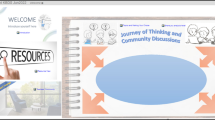Abstract
The advent of generative AI has caused both excitement and anxiety among educators. Some school systems have gone so far as to ban it altogether. Generative AI has the potential to transform human learning; but like any new technology, it has both strengths and weaknesses, and adopting it involves some risks. There are risks that generative AI will mislead learners with wrong information, or that learners will use it to do their homework and take tests for them. This article presents some ways to take best advantage of generative AI, while managing and mitigating the risks. It also suggests some uses of generative AI to avoid. These insights are informed by learning science and extensive experience developing AI-enabled learning products. If applied properly, generative AI can dramatically accelerate human learning and do so at scale.
Similar content being viewed by others
References
Ahmed, S. (2022). Learn Python with ChatGPT. The Developer Space, December 26, 2022.
Elliot, L. (2023). Those schools banning access to generative AI ChatGPT are not moving the needle and are missing the boat, says AI ethics and AI law. Forbes, Jan. 20, 2023.
Friedman, T. L. (2023). Our new Promethian moment. The New York Times, March 21, 2023.
Fulford, I., & Ng, A. (2023). ChatGPT prompt engineering for developers. Retrieved May 31, 2023 from https://www.deeplearning.ai/short-courses/chatgpt-prompt-engineering-for-developers/.
Future of Life Institute (2023). Pause giant AI experiments; An open letter. Retrieved May 31, 2023 from https://futureoflife.org/open-letter/pause-giant-ai-experiments/.
Herman, D. (2022, December 9). The end of high-school English. The Atlantic.
Johnson, W. L. (2010). Serious use of a serious game for language learning. Int J of Artificial Intelligence in Ed 20.
Johnson, W. L. (2019). Data-Driven Development and evaluation of Enskill English. Intl Journal of AI in Education, 29, 425–457.
Johnson, W. L. (2021). Case study: Rapid training of community health workers using Enskill®. International Journal of Advanced Corporate Learning, 14(2), 44–49.
Johnson, W. L., & Lester, J. C. (2016). Face-to-face Interaction with Pedagogical Agents, twenty years later. Int J AI in Education, 26(1), 25–36.
Khan Academy (2023). Introducing… Khanamigo! Retrieved May 31, 2023 from https://support.khanacademy.org/hc/en-us/community/posts/13992414612877-Introducing-Khanmigo.
Klein, A. (2023). ChatGPT Cheating: What to do when it happens. EducationWeek, Feb. 21, 2023.
Koedinger, K., Carvalhu, P. F., Liu, R., & McLaughlin, E. A. (2023). An astonishing regularity in student learning rate. PNAS 120:13, Mar 30, 2023. https://doi.org/10.1073/pnas.2221311120.
OpenAI (2023). Introducing ChatGPT. Retrieved May 31, 2023 from https://openai.com/blog/chatgpt.
Ornstein, V. (2023). ChatGPT: What it is and why it is banned in NYC schools. New York Family, March 14, 2023.
Segalowitz, N. (2010). The cognitive bases of second language fluency. Routledge.
Sideridis, G., & Alahmadi, M. T. S. (2022). The role of response times on the measurement of mental ability. Front. Psychol 13, June 17, 2022. https://doi.org/10.3389/fpsyg.2022.892317.
Author information
Authors and Affiliations
Corresponding author
Additional information
Publisher’s Note
Springer Nature remains neutral with regard to jurisdictional claims in published maps and institutional affiliations.
Rights and permissions
Springer Nature or its licensor (e.g. a society or other partner) holds exclusive rights to this article under a publishing agreement with the author(s) or other rightsholder(s); author self-archiving of the accepted manuscript version of this article is solely governed by the terms of such publishing agreement and applicable law.
About this article
Cite this article
Johnson, W. How to Harness Generative AI to Accelerate Human Learning. Int J Artif Intell Educ (2023). https://doi.org/10.1007/s40593-023-00367-w
Published:
DOI: https://doi.org/10.1007/s40593-023-00367-w




